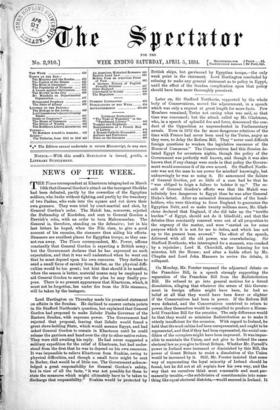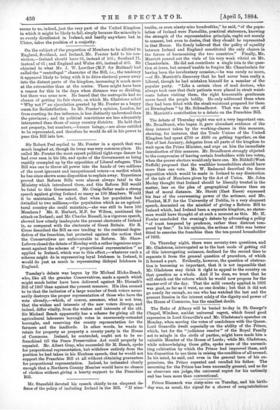On Monday, Mr. Forster reopened the adjourned debate on the
Franchise Bill, in a speech strongly supporting the separation of the Franchise Bill from the Redistribution Bill. He refused to go into general motives for a forced dissolution, alleging that whatever the errors of this Govern- ment in foreign affairs might have been, he had no belief at all that they would have been fewer or slighter if the Conservatives had been in power. If the Reform Bill were defeated, and the Conservatives contrived to return to power, they themselves would be compelled to produce a House- hold Franchise Bill for the counties. The only difference would. be that they would so minimise Redistribution as to make it utterly insufficient for the occasion. With regard to Ireland, he held that the mud-cabins had been unrepresented, and ought to be represented, and that if they had been represented, the social con- dition of the occupiers might have been improved. It was impos- sible to maintain the Union, and not give to Ireland the same electoral law as you give to Great Britain. Whether Mr. Parnell's power in Ireland were increased or diminished by this Bill, the power of Great Britain to resist a dissolution of the Union would be increased by it. Still, Mr. Forster insisted that some way of representing the loyal minority of Ireland should be found, but he did not at all explain how his own way, and the way that we ourselves think most reasonable and most per- manently tenable,—the subdivision of constituencies into some- thing like equal electoral districts,—would succeed in Ireland. It
seems to us, indeed, just the very part of the United Kingdom in which it might be likely to fail, simply because the minority is so evenly distributed in Ireland, and hardly anywhere but in Ulster, takes the position of a majority.















































 Previous page
Previous page